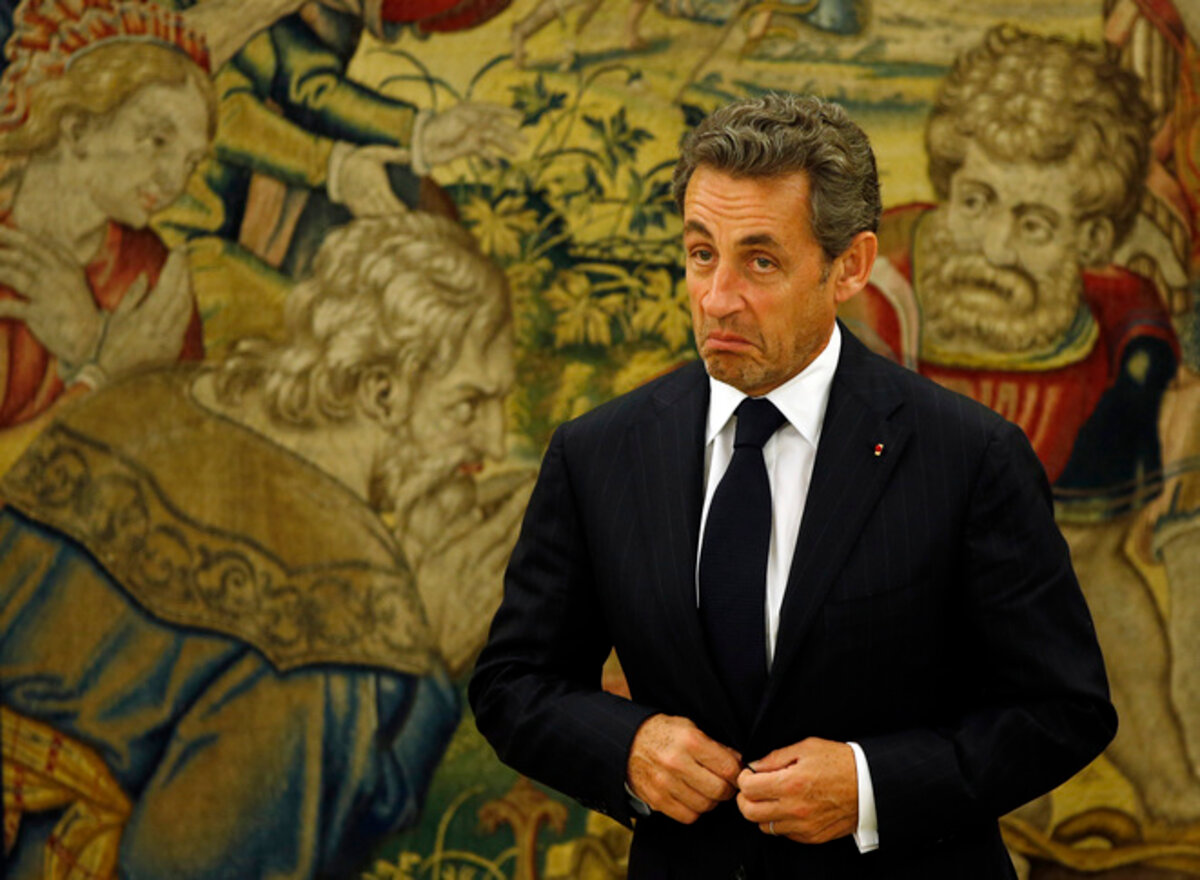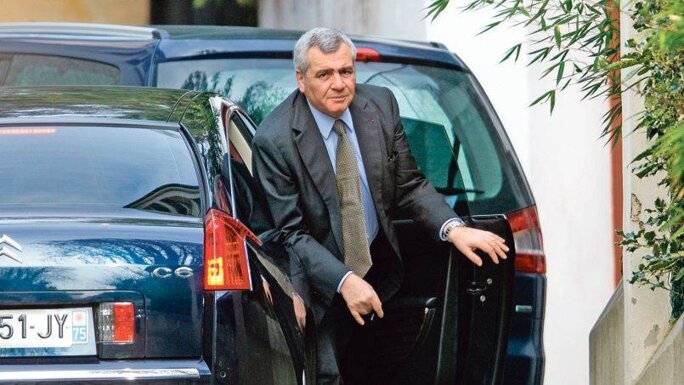It is yet more bad news for Nicolas Sarkozy on the judicial front. On March 29th, 2018, Le Monde revealed that the former head of state is to be sent for trial on charges of corruption and influence peddling. The charges relate to claims that the former president tried to get crucial information from a judge about the progress of a legal case involving him, in return for which he offered to help get that judge a prize posting in Monaco. The judge in question, Gilbert Azibert, will stand trial on similar charges as will Sarkozy's friend and lawyer Thierry Herzog. Herzog also faces a charge of breaching professional secrecy rules, and Azibert one of receiving the results of that breach. All three men deny any wrongdoing.
The news comes just eight days after Sarkozy was placed under formal investigation over claims of Libyan funding of his successful 2007 presidential campaign. The former president is already facing a trial over claims that he “knowingly” exceeded campaign spending rules in his failed 2012 presidential election campaign by 22.5 million euros.

Enlargement : Illustration 1

This latest case in which Sarkozy faces a trial itself arose as a result of the Libyan funding investigation, though the allegations are quite separate. The two examining magistrates in the Libyan investigation, Serge Tournaire and René Grouman, who started investigating the case in April 2013, decided to carry out phone-taps on the former president, as permitted under French law. Sarkozy's former close allies and former ministers Brice Hortefeux and Claude Guéant also had their phones tapped.
However, the judges and detectives found out that Nicolas Sarkozy had become much more wary about what he said in telephone conversations. This followed embarrassing public revelations about a tapped phone conversation between Hortefeux, an ex-minister of the interior, and Christian Flaesch, the most senior detective in Paris, who was subsequently removed from his post.
In fact, judges Tournaire and Grouman discovered that Sarkozy and Herzog, his lawyer and friend for 30 years, had bought pre-paid phones under false names so they could communicate discreetly. One of the phones used by Sarkozy was opened under the name of Paul Bismuth – the name of someone he knew in his youth – and so in France this is sometimes known as the 'Bismuth affair'.
When the judges read the transcripts from the conversations on those phones it appeared that the former president and his lawyer had unofficially been seeking information on two other legal cases from a senior magistrate called Gilbert Azibert. Azibert was the senior Advocate General at France's top appeal court the Cour de Cassation, and was known to both Sarkozy and Herzog.
Gilbert Azibert informed the pair of developments in the long and complex Bettencourt case. Sarkzoy had had the case against him in this affair dismissed. But he was anxious that the diaries that had been seized in relation to this case should be returned to him, to make sure they could not be used against him in other affairs, for example the Libyan funding saga. But Azibert also told them that judges at the Cour de Justice de la République – a special court that only tries ministers – were taking a keen interest in the same diaries in relation to the case targeting former minister and current International Monetary Fund managing director Christine Lagarde in the Tapie affair involving businessman and former politician Bernard Tapie.
Aged 67, Gilbert Azibert was near the end of his career and knew all the judges at the Cour de Cassation. In relation to Sarkozy's diaries the magistrate spoke with several of his colleagues and consulted the exchange of documents on the court's intranet which is used to prepare hearings and ensure cases are up to date. He was not supposed to do this as he was working in the civil division of the Cour de Cassation and the sensitive cases at the time – including the Bettencourt affair – were being handled by the criminal division.
According to the phone-taps involving Sarkozy and Herzog, in exchange for these tip-offs Gilbert Azibert asked for “strings to be pulled” so he could become a state councillor in Monaco after he had to retire as a magistrate, the date of which was fast approaching. For him it would mean a very comfortable end to his career.
On February 14th, 2014, judges Tournaire and Grouman sent the transcripts and the potentially criminal activity they displayed to Éliane Houlette, head of the national financial and fraud prosecution unit the PNF. On February 26th of that year she opened a formal investigation into the matter.
This case was handed to the examining magistrates Patricia Simon and Claire Thépaut and they investigated the conversations between the three men and ordered a number of searches. In particular they discovered several elements of the Bettencourt proceedings in Gilbert Azibert's office and home. The magistrates also investigated the week's holiday that Nicolas Sarkozy and Thierry Herzog spent in Monaco, to find out whether the men had been trying to help Azibert get a position there.
Azibert, who occupied senior positions under the presidencies of both Jacques Chirac and Nicolas Sarkozy, was a friend of Thierry Herzog. Herzog has crossed paths professionally with his friend on more than one occasion. In June 2001, for example, Herzog succeeded in getting the annulment of part of the investigation targeting Jean Tiberi's wife Xavière Tiberi over allegations of voting fraud in Paris's 5th arrondissement or district.
A few months earlier the lawyer had won a ruling from the court of appeal annulling other proceedings against Xavière Tiberi, this time in relation to allegations of fictitious employment at the general council of the Essonne département – broadly equivalent to a county. In particular she had received 200,000 francs (about 30,000 euros) in 1994 for a 36-page report on the French-speaking world, a report found to be riddled with errors, which some alleged was written after the affair broke in order to justify the payment.
At this period Azibert was the president of the investigations chamber at the court of appeal in Paris, a position he held from 1999 to 2002, which dealt with both Tiberi cases. In that role Azibert was loved by criminal defence lawyers as much as he was hated by examining magistrates. He annulled proceedings in several investigations for what some considered harsh reasons, citing errors in procedure and technicalities, earning him the nickname of “Annulator” (“Annuller”).
A man with many contacts, Azibert had also been in charge of the prisons body the Administration Pénitentiaire from 1996 to 1998 and the judges' training college the École Nationale de la Magistrature from 2002 to 2005. He was later promoted by President Sarkozy to become secretary general at the Ministry of Justice where he served from 2008 to 2010 under justice minister Rachida Dati. Though he had reached the age of retirement by 2012, Gilbert Azibert's career was prolonged at the Cour de Cassation by a decree issued by Nicolas Sarkozy on May 9th, 2012, just after Sarkozy had lost the election but before the newly-elected president François Hollande had taken up office.
Damning phone-tap transcripts
In January 2016 Mediapart revealed details of a decision by the court of appeal in Pars that validated the judges' use of the phone taps and the material they contained. The document included several transcripts of conversations between Thierry Herzog and Nicolas Sarkozy. Between January 28th and February 5th, 2014, the two men spoke about Gilbert Azibert's contacts with his fellow judges and about the information he had gleaned about the legal attempt to get Sarkozy's diaries returned. “He's been working,” said Herzog on January 29th. According to him Azibert was confident about the outcome of the proceedings “unless the law ends up winning...”
During a conversation recorded on February 1st, Nicolas Sarkozy made a reference to his concerns about rumours of searches that might target him on an aspect of the Libyan case which he was fighting against Mediapart. He asked his lawyer to “make contact with our friends so that they're watchful”, which seems to give credence to the idea that a network of informers existed inside the police and the Parisian lawyers' body the Ordre des Avocats de Paris.

Enlargement : Illustration 2

On that same day Thierry Herzog called Nicolas Sarkozy to ask him to respond to him on the phone they suspected was being tapped “to give the impression of having a conversation”. Then on February 5th Thierry Herzog mentioned Azibert's desire to have a few strings pulled in Monaco and Nicolas Sarkozy replied that he would speak to the prince – Prince Albert of Monaco. It was a promise that came to nothing in the end. This is what the two friends said on the subject on February 25th, 2014.
- (Sarkozy) : “I meant to tell you, so that you can say something to Gilbert Azibert, I've got a meeting at midday with Michel Roger, the minister of state of Monaco.”
- (Herzog) : “Minister of state, yeah, ok great I'll call him now.”
- “He wants a position of state councillor?”
- “Uh, yes, which will be free in March and which he had applied for saying he'd like it as a position as it's something he can do.”
- “Good, um, there you go, um listen ….”
- “Because the state councillor is going. So they're going to look for his replacement.”
- “Ok you can tell him that I'll do it at midday, then I'll call you to tell you what the situation is.”
Once again Nicolas Sarkozy did nothing about it, as he explained in another conversation with his friend the next day. “It didn't come up in the conversation … it annoys me asking about something I don't know very well,” said the former president.
On March 17th, 2014 detectives from the fraud squad the DNIFF informed the judges Patricia Simon and Claire Thépaut that Thierry Herzog must have received confidential information on February 25th, 2014. “Only that information on the investigations in course can explain the change in the two callers' comments and the abandonment of the use of the lines under surveillance” on the same day, the officers wrote.
However, the precautions taken by Nicolas Sarkozy and Thierry Herzog did not stop investigators from discovering all their phone lines and from piecing together some of their conversations, which have proved very embarrassing for the two old friends. A conversation between Herzog and Gilbert Azibert on May 19th, 2014, also shows the senior magistrate's anxiety after searches had been carried out at his home. “I told them that actually it was you who had sent me the decision of the investigations chamber [editor's note, of the court] on the problems of criminal procedure,” he told Herzog, almost certainly referring to the Bettencourt case.
Further investigations by the judges failed to find accomplices or the source of leaks among the police, justice system or the lawyers' professional body. All three men, Gilbert Azibert, Thierry Herzog and Nicolas Sarkozy, have used procedural arguments in a vain bid to get the case dropped. In particular the former president's lawyers Jacqueline Laffont and Pierre Haïk had claimed that the proceedings harmed their client's rights to a fair defence and claimed that the various searches and also the phone-taps should be declared invalid. However, on March 22nd 2016 the Cour de Cassation upheld the legality of the process.
----------------------------------------------------------------------------
- The French version of this article can be found here.
English version by Michael Streeter


